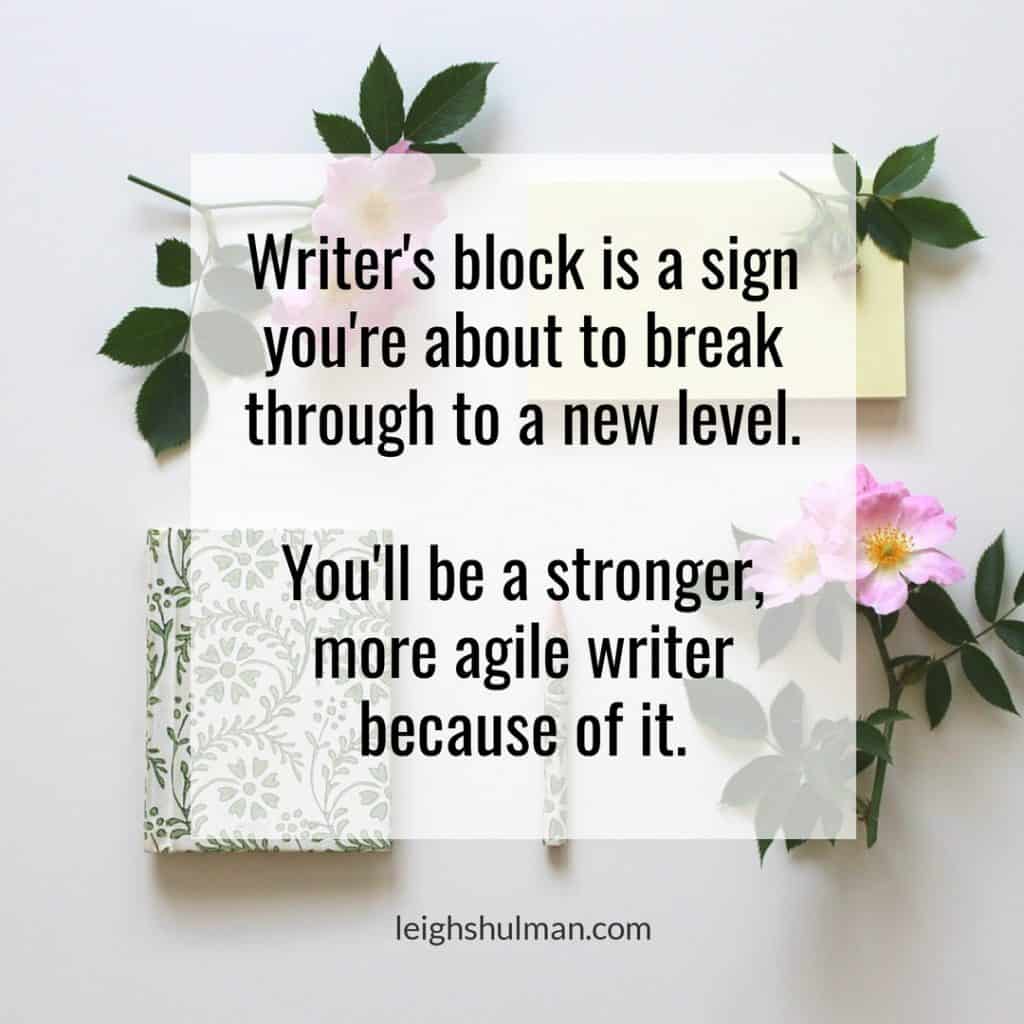There’s no such thing as writer’s block. It’s an excuse. Your way of telling yourself you have a reason for not writing. I’m here to tell you, you’re not fooling anyone.
That’s not to say you won’t ever feel stuck. You will. You will often find yourself slammed face first into that big wall called finishing. It will feel like there is no way through, around or over.
Here’s the thing: Every writer who has ever existed feels stuck at some point. That’s why I say there’s no such thing as writer’s block, because it’s part of the writing process.
Anyone who says otherwise is either lying, or they’re not very good writers. In fact, feeling stuck can be a blessing. Yes, I said a blessing, but more on that later.
How to move past the stuck?
First, tell yourself it happens. Everyone gets stuck, and you will get through it. You may not write the most perfect thing ever written. So what? That’s why we edit. Stop thinking about the audience or timeline or what should be.
Then sit down and try one or more of these exercises.
Free write
I say this over and over. I take time for freewriting in every class I teach and to begin every new piece of writing. I say it again and again, because there is no better way to write yourself out of a quandary.
Free write your problem. Start by stating exactly what you’re feeling and what’s holding you back. Vent, bullshit and explain what you’d like your writing to do. Say whatever you need to say. Do this for at least 10-15 minutes.
For a more detailed free writing how-to, check out this writing prompt.
Every writer needs to read.
Turn to a favorite author. Open a book from someone you’ve been meaning to read. Read fiction, non-fiction, speeches, politics. Read something you enjoy.
The two biggest benefits of reading?
You change the voice in your head. I don’t think like David Sedaris. I tend to be darker, more serious. After reading Me Talk Pretty One Day — which had me laughing from page one — I was able to lighten up a bit. Chuck Wendig’s writing has a similar effect on me. He’s intense, funny and draws incredible fantasies with his words. I love when a little bit of his tone slips into my language.
Reading another’s writing also provides you with a toolbox for your own writing. You see how another writer handles transitions, their language and how they introduce characters. Books model other methods you can incorporate into your own work.
Check out these Six Books To Bust Writer’s Block
See your words in a new way
Many of us tend to type directly on our computers. After a time, though, we stop paying attention. It’s easy to gloss over paragraphs instead of seeing them. There are many ways to get past this.
These are three favorites.
- Print and read. Take notes by hand directly on the paper.
- Read out loud. Ask a friend or loved one to listen if it feels strange reading to no one.
- Cut and paste. Print, then cut your work into paragraphs. Puzzle piece them back together to find your structure.
Every writer needs a reader.
If you’re in writing deadlock, you’re not the best judge of your own writing. That’s when you need a pair of fresh eyes. Give your writing — in whatever state it’s in — to someone you trust for a read through.
Comments from a good reader can do wonders to shift your writing and move you past writer’s block. A good reader gets you out of your head so you can see what’s working, what’s not working and exactly what needs to be edited and what should be left alone.
Improvise
Do something that stimulates your creativity without putting words on paper. Paint, sculpt, draw or listen to music.
When you engage in an activity that allows you to improvise, your prefrontal cortex — the part of your brain that governs rational thought — shuts down. Meanwhile, the creative part of your brain goes free.
This allows you to get out of your own way, so when you return to writing, where you are thinking, structuring and rationalizing, you return with a rested brain..
Looking for more ways to slip through the knot of writer’s block? Here are 7 More Ways to Crush Writer’s Block.
Being stuck can be a blessing
When you write what you know, what you’ve always written, you have a pattern. You know what you’re doing because you’ve done it before. Many times.
Which is, I’m sorry to say, boring.
When you’re stuck, it’s often because you’re doing something you’ve never done before. That means you’re stretching yourself as a writer. You’re improving, and soon enough you will break through to a new level. You’ll be a stronger, more agile, better writer.


